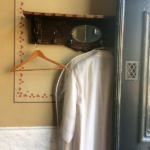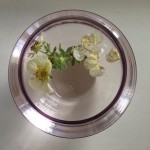A weekend filled with art - Zaltbommel Kunstrondje XL - and opportunities to visit houses…
From space to place: a garden?
For a place to be a garden, traditionally, it has to be enclosed and privileged. Enclosed because it needs restricted access, to be granted only by the owner who is both privileged and sharing privilege, sharing access. My outdoors lab is enclosed. But it is in-between as far as access goes: neither fully public nor fully private. I do not control access, being in the position of the squatter. I have taken hold of a piece of real estate that I do not own, rent, lease or otherwise have title to. But I couldn’t help but get some teak patio furniture for the garden. Nobody seems to want it, but I do. My claim is made the way Michael Pollan suggests: working the land confers a valid title to it. I’m doing this private act – gardening – in a sort of public space, making the act of gardening equivocal.
A garden is a place where culture and nature meet. For a garden to be all culture is boring, for it to be all nature is boring too. Finding the right mix between nature and culture, and maintaining this mix, is the art of the garden designer and the gardener. My outdoors lab can become very interesting seen in this context. It was all culture, part of a factory complex, concrete and asphalt. Then it was abandoned and nature took her chance to overwrite culture. Now here I am thinking about taming this neo-nature, of acting on this ‘terrain vague’ and writing culture upon nature again.
A garden presupposes pleasing form, be it symmetrical or flowing, and abundant colour. A garden is a landscape that speaks a human language, a place where cultural expectations play upon nature. It is a carrier for a lot of human tropes: A rose is never just a rose. We expect a garden to have form, but also something unexpected, something to be explored. Quote from ‘second nature’ page 243: “The good gardens seem to strike a pleasing or intriguing balance between here and there; unsatisfying ones err on one side or the other. A garden that’s all there (a lawn, a zoo) is likely to feel imposed on the land, cold or abstract; a garden that’s all here (like most ‘natural’ or ‘wild’ gardens) is apt to be slack or insipid, indistinct from the surrounding landscape.
A garden is a place of work: plant, sow, prune, weed, harvest.Funny thing is – I have already harvested – made jam with brambles and elderberries. So I started at the end, not a bad idea. Then went to the beginning: have sown, pruned and weeded. Did I – by doing this – make the place into a garden? In my own mind I most certainly did. In the minds of others I didn’t : not enough visible clues.
A garden is a place of leasure: sun-bathe, read a book, have a party, a barbeque, meditate, sit still, find refuge from a chaotic world
A garden is a place to use: hang washing out to dry, park bicycles, have swings and other outdoors toys
A garden is a place of memory. Nothing does connect me to my childhood like smells and textures. Pollan (again), page 243: Page 243: As everybody knows, it is not so much the eye that summons the gardens of chidhood, but the nose.” “Here, I think, is the deepest spring of the past’s power in the garden; gardening is one of the very few arts (cooking is another) to make use of the olfactory sense, to harness its uncanny knack for unleashing memory. Madeleines are everywhere in the garden (and surely Proust is its guardian spirit).”
So I see two different ways of introducing the idea of ‘garden’ into the mind of the Tractie people. I can start introducing visual elements to the lab, elements that have colour, that have form, that are distinct but not disconnected from the surrounding landscape. All this to give visible clues that yes – this wasteland can be seen as a garden. What I can also do is start using it as a garden – and make this visually clear. Have a picknick, a party, hang my washing out to dry. Added to this I can introduce the element of the unexpected: hey you, don’t stay in your cubbyholes, there is a world out here that can be explored.And, basically, that is what I am trying to do out there. Change the Tractie people’s perception of this space, make them step out of their everyday routine and start exploring.
| « The Former West Conference 6/11/09 | <-- previous post | next post --> | The Former West Conference 7/11/09 » |
|---|







